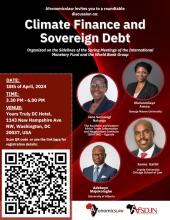Invitation: Climate Finance and Sovereign Debt - Afronomicslaw Event on the Sidelines of the Spring Meetings of the IMF and World Bank Group
March 23, 2024
Afronomicslaw.org invites you to a roundtable discussion on Climate Finance and Sovereign Debt organized on the Sidelines of the Spring Meetings of the International Monetary Fund and the World Bank Group
Date: 18th April, 2024
Time: 3:30pm - 6.00pm
Venue: Yours Truly DC Hotel, 1143 New Hampshire Ave, NW, Washington, DC 20037, USA.
